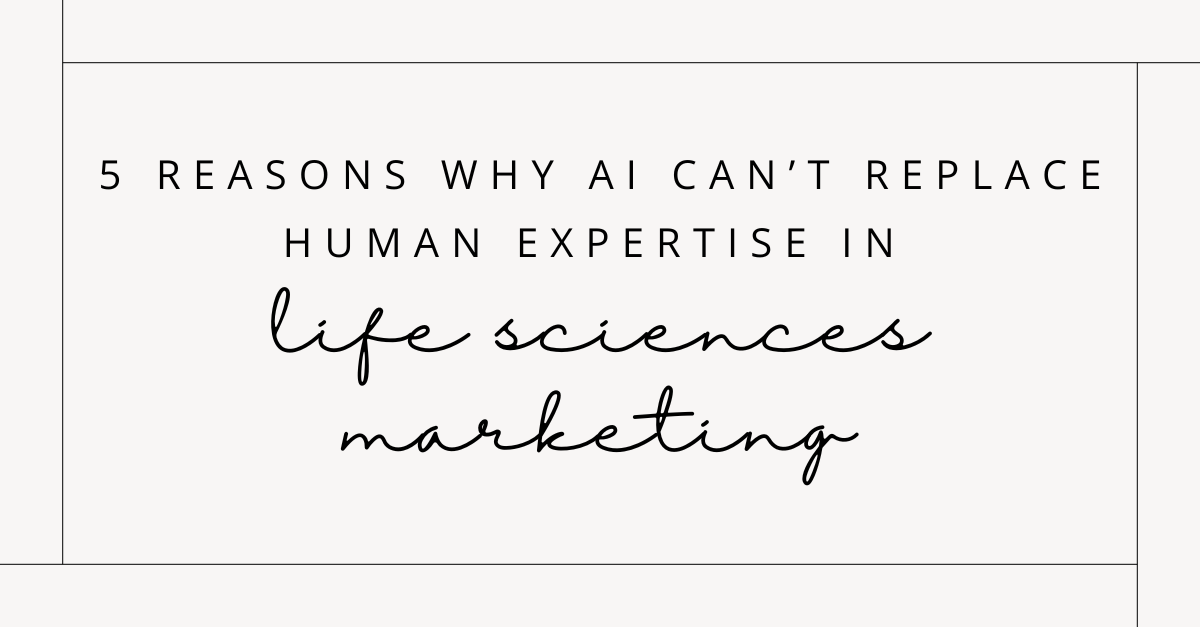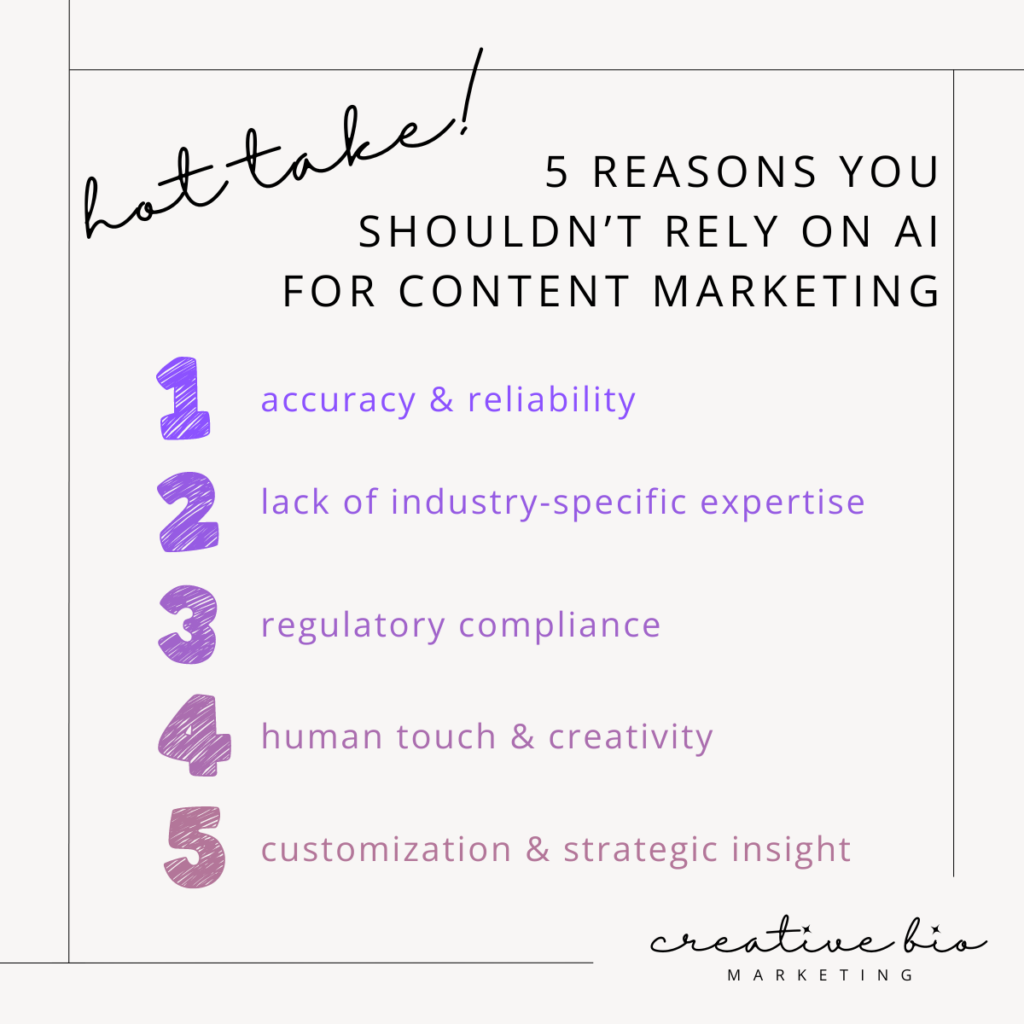
Five Reasons Why AI Can’t Replace Human Expertise in Life Sciences Marketing
five reasons Why AI can’t Replace Human Expertise in Life Sciences Marketing
Hi there, your friendly content strategist here. Today, I’m sharing some news that might break your heart – sorry, not sorry! If you are like me, your newsfeed – wherever that may be – is filled with AI this, and AI tool that… It’s quite overwhelming and the promises are steep. So what’s the deal with AI? Can it really handle all your marketing needs?
AI Limitations in the Life Sciences
Well, my colleagues, sadly due to AI limitations in the life sciences and healthcare sectors, the answer is naught – bummer! But I’m here to share five reasons why you might not want to use it anyway.

1. Accuracy and Reliability
The life sciences and healthcare fields require highly accurate and reliable information due to their complex and technical nature. Tools like ChatGPT, while knowledgeable, may not always provide the most up-to-date or precise details. This can potentially lead to misinformation, which can have serious ramifications.
I recently saw a post with a bunch of screenshots of Google’s AI search engine results, and it’s the perfect example of the importance of getting things right. The post demonstrated that Google was “manufacturing” information to generate responses in the most concerning way possible. And when it comes to your products and services, you absolutely do not want some obscure technology that you cannot influence making up facts that might misrepresent your brand and message. My takeaway is that humans should be a critical part of any content creation process in the life sciences.
2. Lack of Industry-Specific Expertise
The vast and varied life sciences and healthcare sectors require a deep-seated understanding of scientific technology and landscape, regulatory requirements, and a pulse on the thumb of emerging and innovative breakthroughs. To make things more complicated, all these things are occurring simultaneously at lightspeed and at a snail’s pace. Not a soul out there would describe it as easy to understand.
Now, when it comes to AI, it’s only as good as the information that goes into the model. There is so much power in being able to infer trends and determine value based on all the inputs listed above. For AI to give the same output as a human being, it would need perfect data being continuously fed into its models, and that’s just not happening – at least not yet.
Case in point: I asked ChatGPT why it is limited to created content in the life sciences, and it said, “ChatGPT might lack the nuanced expertise needed to craft content that resonates with professionals in the field or adheres to strict industry standards.” So there you go. It’s really the deep industry knowledge and years of history dealing with complex and scientific technology that makes scientific content creators and marketers so good at crafting brand stories.
3. regulatory compliance
Let’s talk about the complex legal regulatory landscapes that exist in the life sciences and healthcare sectors. As mentioned above, the regulatory landscape undergoes constant updates. This, in combination with regional differences in regulations, makes it challenging for an AI model to incorporate into content outputs. AI tools may also lack the ability to interpret the context and intent of regulations. For instance, while ChatGPT might generate content that appears compliant, it may inadvertently imply off-label uses of a drug, which is strictly regulated. Such language needs human oversight, especially for organizations with regulated products.
So, when it comes to regulatory content, humans are a crucial part of the equation to ensure that regulatory standards are met and to significantly reduce the risk of inadvertent non-compliance arising from AI-generated content. Having humans at the center thus protects and validates any life sciences or healthcare business.
4. human touch & creativity
This is my personal favorite reason – but then again, I might be biased. While AI tools like ChatGPT can spit out some pretty accurate and technically logical information, they tend to lack the flair and creativity needed to make brands stand out. For instance, I’ve never seen an AI spit out an illustrious alliteration – have you? 🤔
Furthermore, authentic content creation is about tying the mission of the organization to the outcomes that could be achieved if a given technology, solution, or service is successfully implemented in the marketplace. This is a task that requires deep understanding and empathy.
Let’s think about content as a game of poker. Like many of the topics already mentioned, nuance and accuracy are the price of buying into the game, while creativity and human touch are the royal flush that will guarantee success in branding and content efforts.
5. customization & Strategic INSIGHT
Marketing strategies in the life sciences and healthcare sectors require custom approaches to reaching target audiences, penetrating target markets, and featuring specific products and services in a favorable light (see my branding strategy blog for a great place to start). And I would argue that while AI can probably generate content that meets some of these objectives, it definitely cannot meet all of them. In my experience, AI-generated marketing plans are technically complete (contain all of the necessary components), but are often generic and do not fully incorporate and highlight the true unique value of life sciences and healthcare brands.
Developing a coordinated, strategic marketing brand and content plan requires human marketers and strategists who can analyze the market, evaluate the competitive landscape, and incorporate customer feedback. While there is a great deal of data gathering in this process, the true value of humans in this process is the ability to comprehend, synthesize, and create without the bounds needed for any brand. The expertise that comes from professionals working in life sciences and healthcare is the glue that holds it all together to accelerate and ignite your marketing efforts so that companies can achieve their business objectives.
My take on AI
After writing all these reasons why AI is not the perfect tool for content creation in the areas where I specialize, I do want to recognize how helpful it can be as a tool to assist in parts of the content creation process.
I often explain that it helps with “writer’s block.” When before I felt like banging my head against my desk, not knowing where to start, with the iconic blinking text cursor on an empty page, now I simply head over to ChatGPT and ask it to give me an outline or suggest a relevant topic. Sometimes, I even throw all my stream-of-consciousness ideas down and ask it to put together a draft based on all my blatherings. Again, the results are never perfect – but it’s a jumping-off point.
Generally, I’m excited for the future of AI and how I can use it to help clients build amazing brands and tell beautiful stories. I, for one, will strive to stay up-to-date on the latest AI advancements for content creation, marketing, and scientific endeavors, with the hope that technology can help us humans in more meaningful ways.
And that’s all for now, my friends. I’d love to know your thoughts. Do you agree? Do you disagree? Let me know!”

